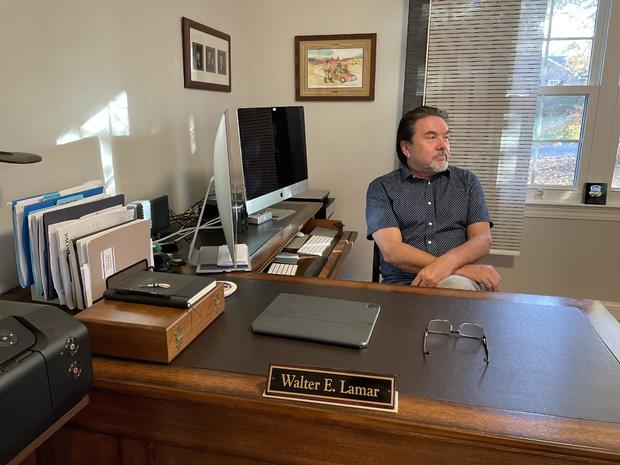Understaffing, investigative mistakes, challenges with recruitment: As the CBS investigative podcast “Missing Justice” details, the gaps evident in the investigation into Christy Woodenthigh’s death affect law enforcement across Indian Country. Montana Sen. Jon Tester is calling for investigations into how federal law enforcement – specifically the Interior Department’s Bureau of Indian Affairs – conducts itself in Indian Country.
In the final episode of the podcast, Tester called for the BIA to conduct a broad “internal” investigation into its law enforcement division and said Congress needs to hold a hearing on BIA’s staffing, manpower and competency.
“I think that if you’ve got law enforcement personnel that are not doing their job, especially when it comes to a homicide or any major crime, then there is a question of competence and training,” the Democrat said in response to trial testimony from BIA agents who admitted to not following certain investigative protocols when they responded to the March 2020 death of Christy Woodenthigh on the Northern Cheyenne reservation. “Those questions need to be answered.”
Tester, who has served in the Senate for 16 years, has previously called for more transparency into the BIA and FBI investigations into the deaths of Woodenthigh and others on the Northern Cheyenne reservation. These new investigations should focus on “law enforcement in general, particularly around large, land-based Indian tribes around this country, because that’s where I think most of the problems are,” he said.
Jamie Benson/CBS News
Tester said he trusts the BIA law enforcement to investigate itself because “if they screw it up and they cover something up,” the agency officials could be fired since they are political appointees.
Woodenthigh’s family and tribal leadership describe in “Missing Justice” how they pushed BIA authorities to investigate her death, and waited for months for an indictment. Last December, the suspect was acquitted at the trial where BIA agents admitted to not following certain investigative protocols. “I don’t feel like justice was served,” Christy’s sister, Aleda Spang, said. “I feel like we have to serve justice ourselves.”
In response to “Missing Justice” reporting, spokespeople for five other senators on the Indian Affairs committee – Republicans Steve Daines from Montana and John Hoeven from North Dakota, along with Democrats Catherine Cortez Masto from Nevada and Tina Smith from Minnesota – also shared calls for increased oversight of BIA law enforcement.
The committee’s chairman, Democrat Brian Schatz from Hawaii, weighed in: “Senator Schatz supports holding a public safety-focused committee hearing during the upcoming Congress,” a spokesperson said.
And to address officer understaffing, Tester said he is working on a bill to boost BIA salaries from its current level of less than $50,000 to recruit agents.
The Interior Department could address understaffing by declaring “a ‘crisis’ in law enforcement in Indian Country, particularly those with the BIA programs to start with,” said Walter Lamar, an enrolled member of Blackfeet Nation in Montana, who spent five years as the head of the BIA’s office of law enforcement and 19 years as an FBI agent. The crisis response could be set up “just like any other disaster or emergency” to leverage more staff and resources from other Interior Department agencies to fill the law enforcement gaps on Indian reservations.
Cara Korte / CBS News
“There may be one or two officers working on a million-plus acre reservation – a million-plus acre reservation – with a population that has drug issues, that has violent crime,” Lamar, a current law enforcement consultant, told CBS News in an interview. “That [understaffing] would not be tolerated anywhere else in this country. That is absolutely unacceptable.”
More members of Congress, which oversees Indian Country policies, need to understand these law enforcement issues in Indian Country are “as big a problem as it is,” Tester said.
Tester said for the past four years, his Senate Democratic caucus has not received updates on Indian Country issues like law enforcement and healthcare because the two senators who gave these briefs left Congress.
The senator pledged to restart these updates, and when asked after the interview when these briefs would begin, an office spokesman said “Senator Tester has been in contact with leadership about issues affecting Indian Country” and is “looking forward to highlighting those issues before his [Democratic] Caucus” in next year’s Congress.
The BIA has not responded to any questions regarding Christy Woodenthigh’s case, the management of the BIA, or Tester’s calls for oversight throughout the six-part “Missing Justice” series. The Interior Department oversees the BIA and the office of Secretary Deb Haaland, the first Native American cabinet secretary, declined an interview request. Haaland’s office also said other Interior Department officials were not “available for this story.”
While this podcast series was being released, the Interior Department and the Justice Department announced a new memo of understanding between the BIA law enforcement and the FBI meant to increase communication between the agencies during Indian Country investigations. The Interior Department also announced its Missing and Murdered Unit solved 68 missing persons cases and five murder cases since the unit formed last year.
CBS News also learned on Dec. 12, that a team of Interior Department officials including Assistant Secretary for Indian Affairs Bryan Newland and U.S. Attorney for Montana Jesse Laslovich, traveled to the Northern Cheyenne reservation to meet with tribal leaders for the first time since the tribe sued the United States. The suit, filed in July 2022, alleges the federal government breached its “solemn fiduciary duties” to the tribe by “failing to provide adequate law enforcement services.”
Two people in the meeting said the officials and Northern Cheyenne leaders met to discuss the case and the meeting lasted nearly six hours.
“Missing Justice” is available wherever you get your podcasts.


